Best Practices for Effective Development Team Outsource in 2025
Wondering if you should outsource your development team? Outsourcing software development offers numerous advantages, including significant cost savings, access to a reliable team of skilled software developers, and the ability to focus on your core business functions. By partnering with a dedicated software development team or an external agency, you can leverage specialized technical skills and innovative solutions that may not be available in your in house team.
This approach also streamlines the recruitment process and enhances project management efficiency, allowing you to better align software projects with your business objectives. Whether you need to fill skill gaps, scale your development process, or accelerate time-to-market, outsourcing your development team outsource is a cost effective strategy to achieve your project goals while optimizing resources.
Key Takeaways
-
Outsourcing development teams offers cost savings, access to specialized skills, and allows companies to focus on core activities, leading to enhanced operational efficiency.
-
Choosing the right outsourcing model and team is crucial, with considerations including communication, technical skills, cultural fit, and project management methodologies.
-
Effective communication, quality assurance processes, and strategic management of time zone differences are essential for successful collaboration and project outcomes in outsourced development.
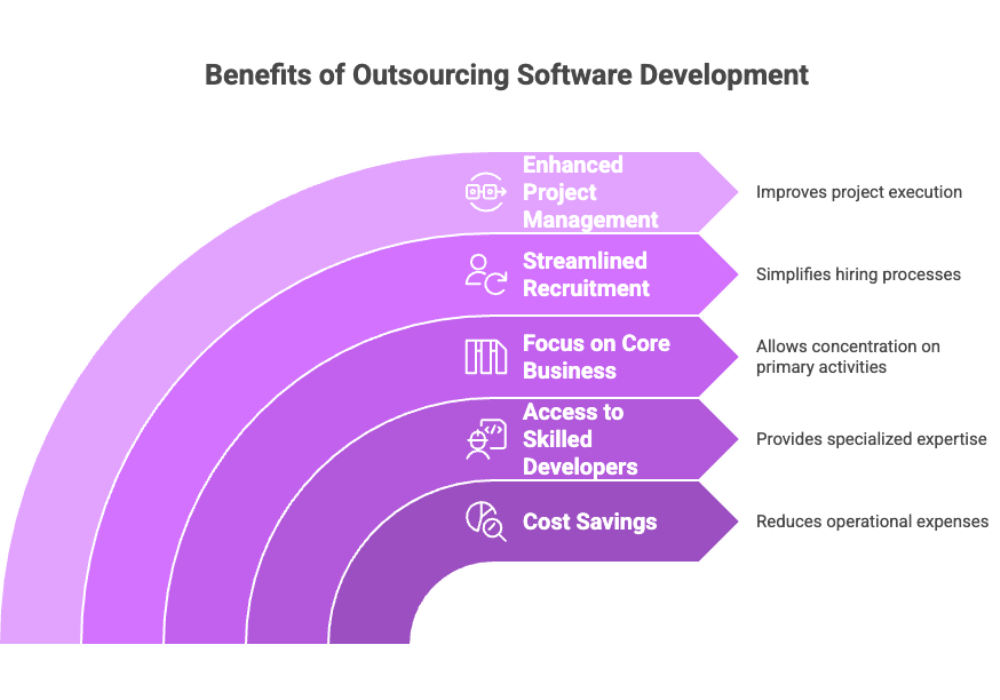

Why Outsource Your Development Team?
Outsourcing your custom software development team can be a game-changer for your business. One of the primary motivations is cost reduction, with nearly 59% of companies aiming to lower expenses through software outsourcing. Leveraging outsourced software development services from a software development company can lead to significant savings, as it allows you to tap into the provider’s expertise and established processes. This is particularly beneficial for startups and SMEs looking to maximize their budgets without compromising on quality. Additionally, many businesses choose to outsource development to enhance their operational efficiency through software solutions.
Another compelling reason to outsource software development is the access to specialized skills and top-level talent from around the globe. Outsourcing enables businesses to:
-
Fill tech gaps and leverage external skills efficiently
-
Ensure that their projects are handled by skilled professionals in the field
-
Access a diverse talent pool that enhances the quality of the output
-
Accelerate project completion times
Lastly, outsourcing allows companies to focus on their core activities while still achieving their development goals. Partnering with an outsourcing partner and an outsourced software development team allows businesses to focus on their strategic objectives while experts handle the technical details. This strategic allocation of resources often results in faster time-to-market and the ability to stay ahead in a competitive market.
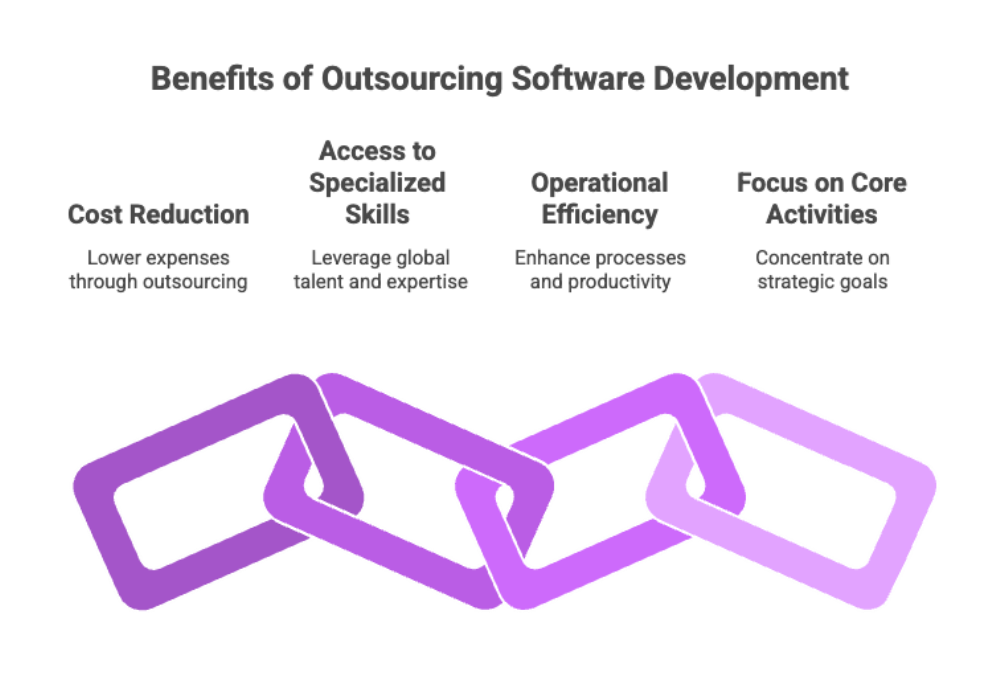

Key Benefits of Outsourcing Software Development Teams
The flexibility to scale projects up or down as needed is one of the most significant advantages of outsourcing software development. This means businesses can quickly adjust team sizes to meet project demands without the long-term commitment and overheads associated with hiring in-house staff. The ability to scale rapidly can be crucial for meeting tight deadlines and handling fluctuating workloads.
Outsourcing also allows businesses to optimize their internal resources more efficiently. Freeing up internal talent to concentrate on core strategic tasks enhances productivity and revenue generation. This optimization is particularly beneficial for startups and small businesses that may not have the internal capacity to handle large or complex outsourcing services project outsourcing companies.
Moreover, outsourcing grants access to a global pool of specialized expertise, fostering innovative solutions and faster project completion times. For example, Google’s outsourcing strategy has allowed it to access global talent and reduce operational costs, leveraging contractors to surpass the number of direct employees. This approach demonstrates how outsourcing can be a strategic tool for achieving business objectives and maintaining a competitive edge.
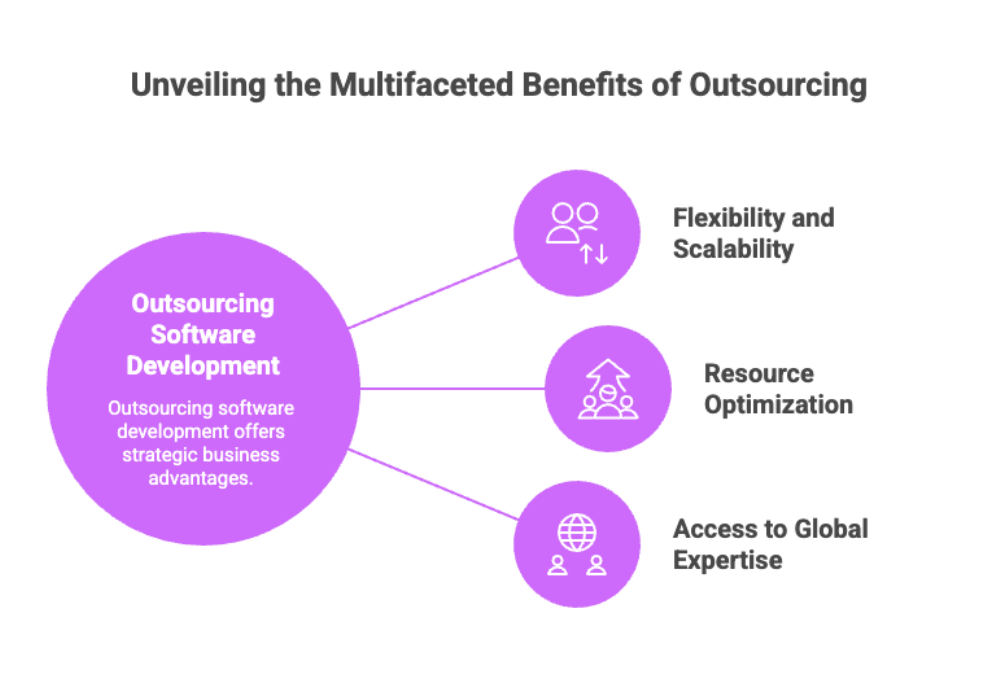

Choosing the Right Outsourced Development Team
Selecting the right outsourced development team is crucial for the success of your software development projects. Important considerations include hiring developers and the recruitment process, as clear communication is essential for effective collaboration. Evaluating potential team members through interviews, using test tasks to assess skills, and assigning small trial projects to gain insights into their expertise and suitability for your project.
It’s important to consider the following when working with an outsourced team:
-
Assess the experience and portfolio of the outsourced team, including the range of projects they have handled and their industry experience.
-
Assign a project manager to enhance coordination and ensure that the development process aligns with your goals.
-
Establish a communication plan that includes regular meetings, reporting forms, and escalation procedures to maintain smooth collaboration. Project managers play a crucial role in this process.
Cultural fit and work ethics are critical factors in ensuring a successful outsourcing relationship. Evaluating the project management methodologies used by the team, such as Agile or Waterfall, can help you understand their approach to planning and execution. Arranging a trial period allows you to observe the team’s performance, responsiveness, and workflow alignment before making a long-term commitment.
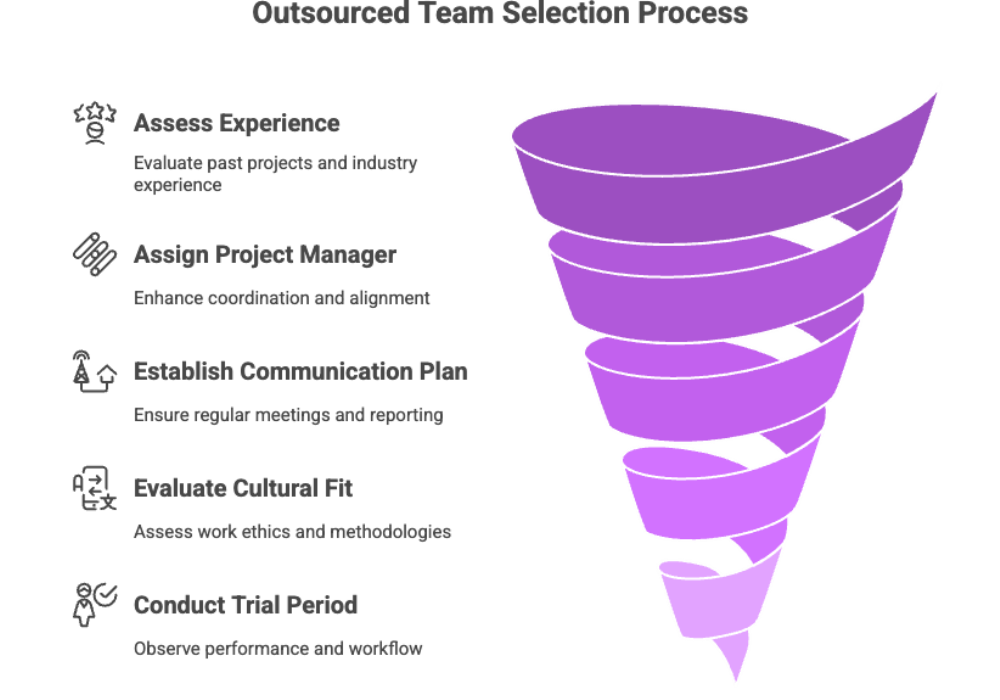

Types of Outsourced Development Models
Understanding the different outsourcing models can help you choose the one that best fits your business needs. The project-based model involves the vendor taking full responsibility for managing the project from inception to completion. Fixed-price contracts in this model provide predictable costs but can be less flexible to changes in project scope.
The dedicated team model is suitable for complex and evolving projects, where an entire team is hired to perform a specific scope of work. This approach allows for specialized skill allocation and ensures that the dedicated software development team operates autonomously while aligning with your goals. This model is particularly effective for long-term projects requiring continuous development and adaptation, especially when utilizing a reliable team and dedicated development teams.
Staff augmentation entails incorporating external developers into your current team. This is done by utilizing a third-party vendor. This model allows for increased capacity and flexibility, with the time and materials model enabling adaptive budgeting based on actual time spent and resources used. Each of these models serves unique business needs, and understanding their pros and cons can help you make an informed decision.
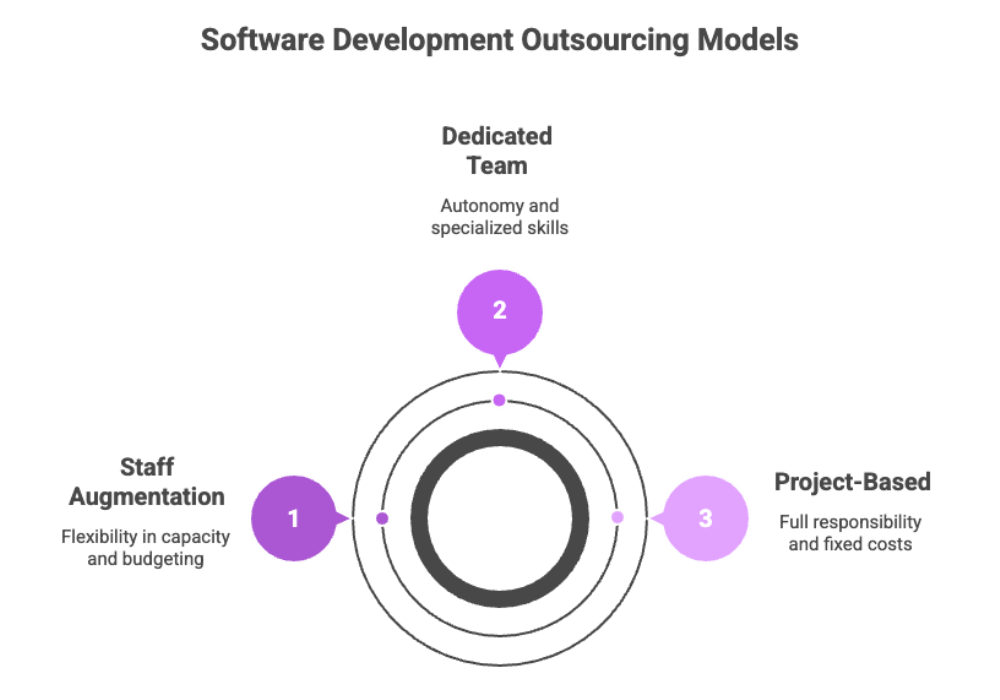

Evaluating Technical Skills and Project Management Capabilities
Evaluating the technical skills and project management capabilities of an outsourced development team is vital to ensure they can meet your project’s requirements. Reviewing past work and portfolios can provide valuable insights into the team’s experience and ability to handle similar projects. Client testimonials are also useful for gauging the reliability and performance of the team.
When assessing an outsourced team, consider:
-
Their technical skills
-
Communication abilities
-
Problem-solving capabilities
-
Cultural fit
The choice of project management methodologies, such as Agile or Waterfall, can significantly influence how well the team delivers the project. Monitoring progress through project management tools is crucial for keeping track progress of workflow and milestones.
Understanding how the team manages changes during a project can also impact the overall outcome. Evaluating their project management methodologies, including Agile, Scrum, and Waterfall, can help you optimize task allocation and monitoring. This comprehensive assessment ensures that you select a team capable of delivering high-quality results.
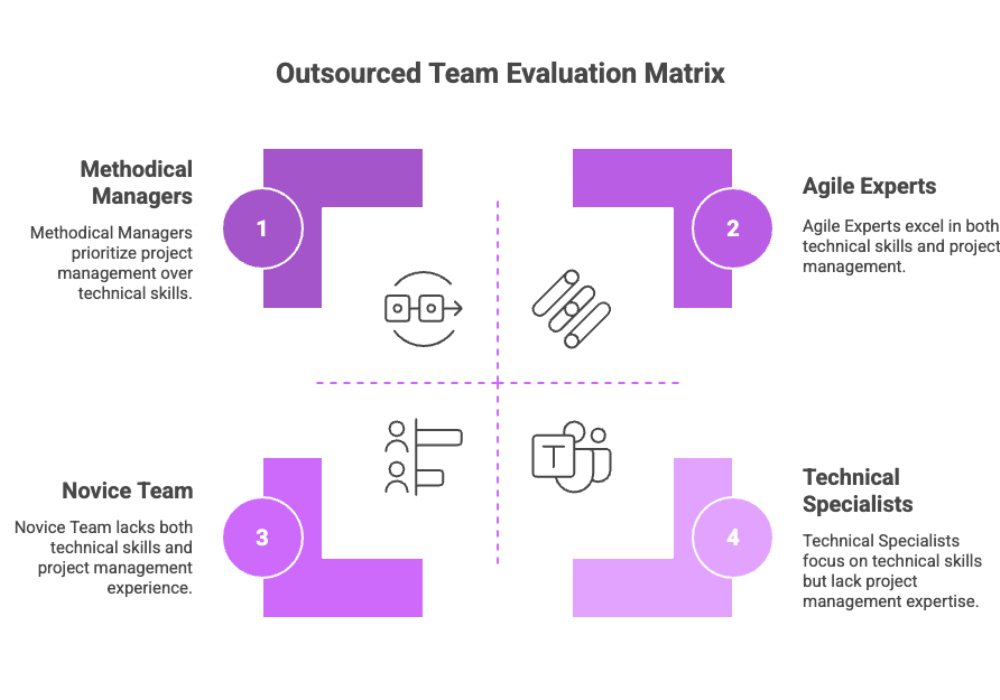

Protecting Intellectual Property in Outsourced Development
Protecting your intellectual property (IP) when outsourcing software development is paramount. Ensure that your outsourcing contracts explicitly define that you retain full ownership of all developed software and materials. Signing Non-Disclosure Agreements (NDAs) is essential to legally prevent outsourcing partners from sharing or using proprietary information.
Implementing role-based access controls can minimize risks by restricting access to sensitive information based on team members’ roles. Utilizing secure development environments, including encrypted channels and secure repositories, protects intellectual property from unauthorized access.
Establishing a clear exit strategy ensures that all developed assets and documentation are returned, with no copies remaining with the outsourcing provider.
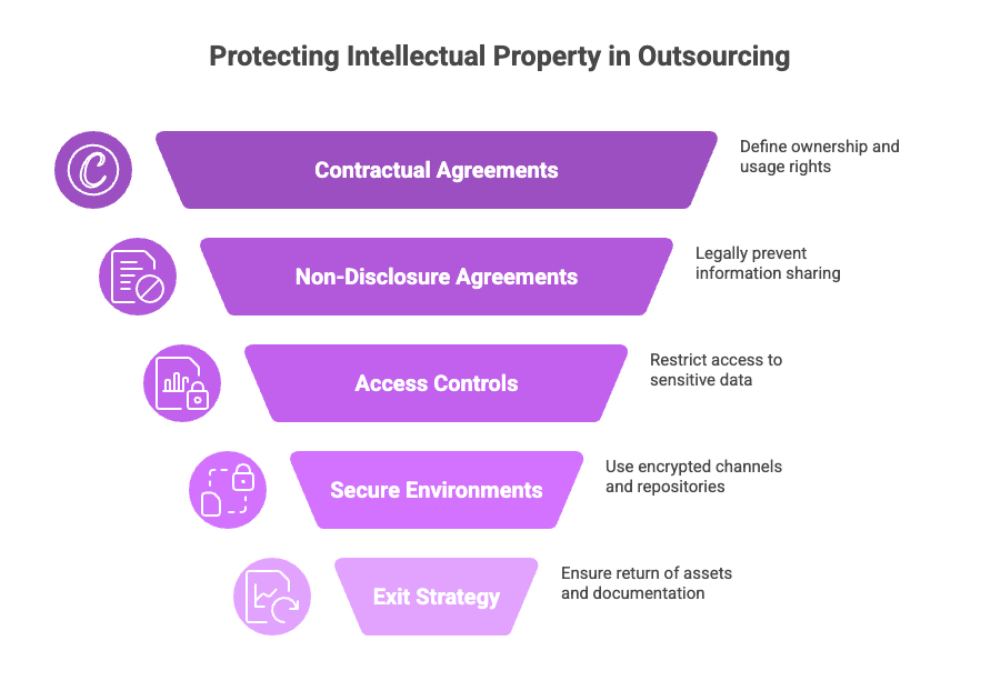

Effective Communication Strategies with Outsourced Teams
Effective communication is the backbone of successful collaboration with outsourced teams. Key practices include:
-
Implementing clear communication channels and project management systems to enhance overall communication.
-
Conducting regular check-ins to align on goals.
-
Setting deadlines to ensure smooth project execution.
Incorporating regular virtual meetings can significantly improve communication within outsourced teams. Key strategies include:
-
Utilizing tools like Slack and Microsoft Teams to maintain continuous communication.
-
Creating a culture of open feedback to enhance trust and communication between in-house and outsourced teams.
-
Designating a primary contact within the outsourced team to streamline communication and resolve issues rapidly.
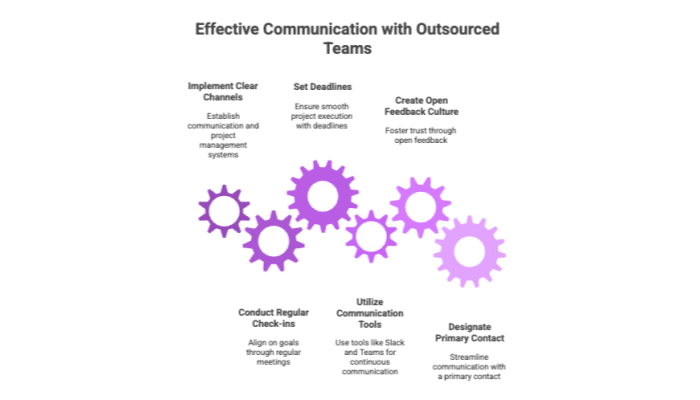

Ensuring Quality Assurance in Outsourced Software Development
Maintaining quality assurance in outsourced software development projects is crucial, as addressing issues post-deployment can be significantly more expensive than ensuring quality during development. Outsourcing firms often provide dedicated testing and adherence to best practices, leading to improved software projects quality.
Implementing rigorous testing processes throughout the development cycle is essential for identifying and resolving defects early. Automated testing tools enhance the efficiency of testing, allowing for broader coverage and quicker identification of issues. Continuous performance monitoring helps track key metrics such as code quality and defect density.
AI-powered testing and QA technologies allow development teams to automate routine tasks, enabling them to focus on innovative solutions. These tools can identify vulnerabilities that manual testing may overlook, leading to fewer post-launch issues. Ensuring consistent coding standards and resolving bugs is essential for maintaining high quality and future maintainability, especially for qa specialists. Software compliance is also a critical aspect of this process.
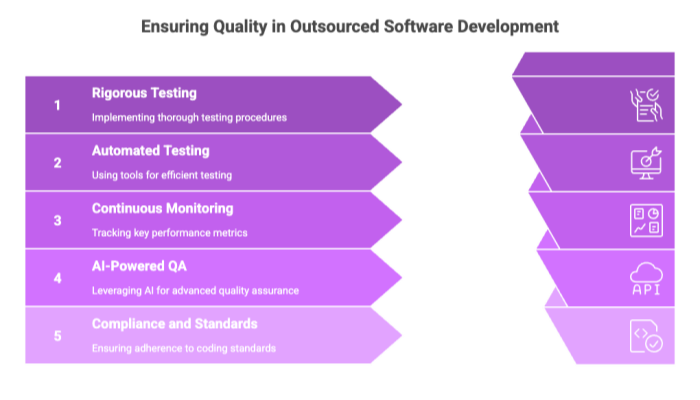

Managing Time Zone Differences
Managing time zone differences can be a challenge, but it also offers unique advantages. Engaging with outsourced teams across different time zones can provide round-the-clock project support, enhancing productivity. Identifying overlapping hours between local and offshore teams allows for scheduling important meetings and optimizing communication.
Implementing a rotational meeting schedule can help balance the inconvenience of attending meetings across different time zones. Asynchronous communication practices can maintain workflow efficiency, as teams can update projects without needing real-time interaction.
Strategic placement of offshore developers team leads in overlapping time zones can further enhance communication and accelerate decision-making.
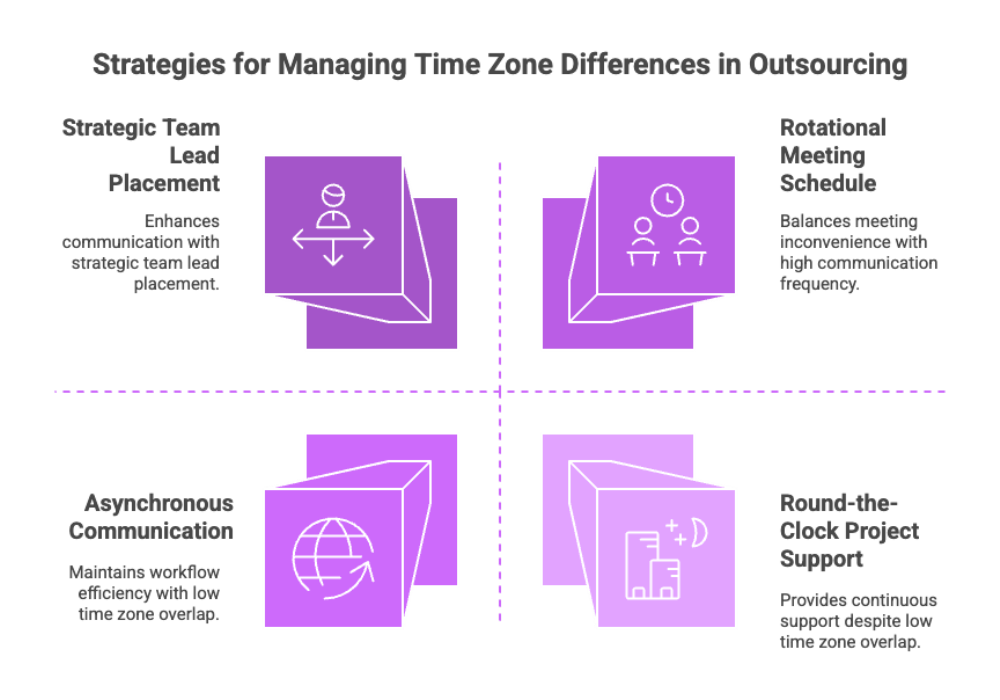

Overcoming Common Challenges in Outsourcing
Outsourcing software development presents challenges such as:
-
Cultural differences, which can affect team dynamics, including work ethics and expectations, potentially leading to misalignments.
-
Quality assurance issues, making it crucial to implement a robust QA process to mitigate risks and ensure high-quality output.
-
Effective knowledge transfer.
Effective communication structures are vital for keeping all parties aligned and minimizing misunderstandings. Establishing regular meetings promotes a collaborative environment and reduces project risks. Clear contracts outlining Key Performance Indicators (KPIs) help set expectations and manage outsourcing risks.
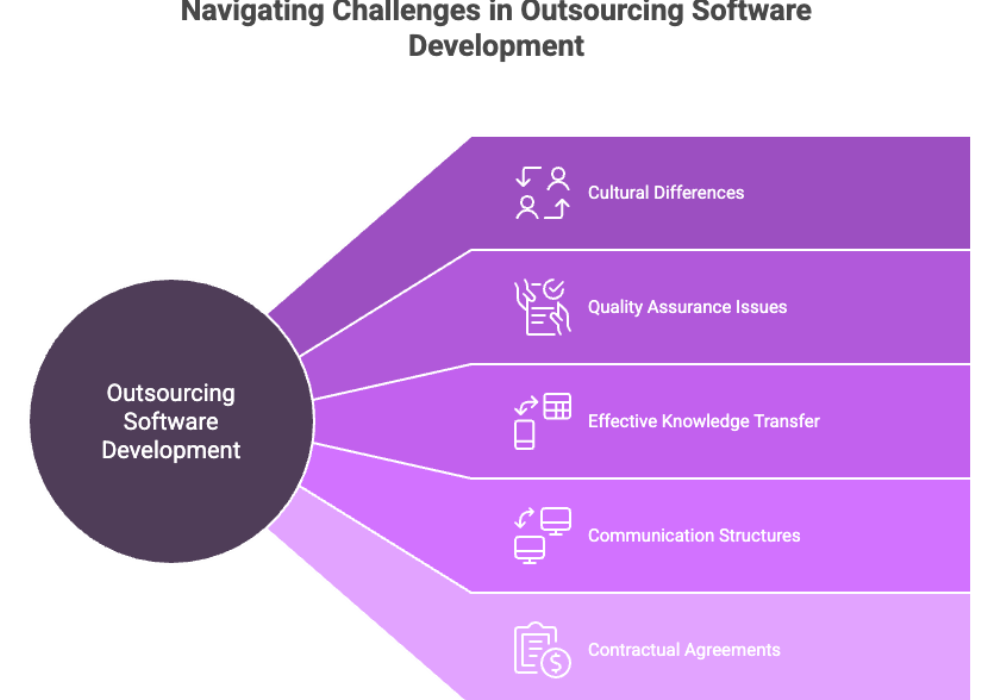

How to Keep Your Outsourced Development Team Engaged?
Keeping your outsourced development team engaged is essential for maintaining productivity and achieving project goals. Focusing on communication is an effective way to boost engagement. Setting standards for communication, doing regular check-ins, and using collaboration tools help maintain communication with outsourced development teams.
Recognizing and rewarding the achievements of outsourced teams can boost motivation and performance. Providing ongoing feedback ensures awareness of performance and encourages continuous growth.
Involving the right outsourced team members and external teams in decision-making can improve their engagement and sense of ownership. Assigning collaborative projects enhances teamwork among outsourced development team members.
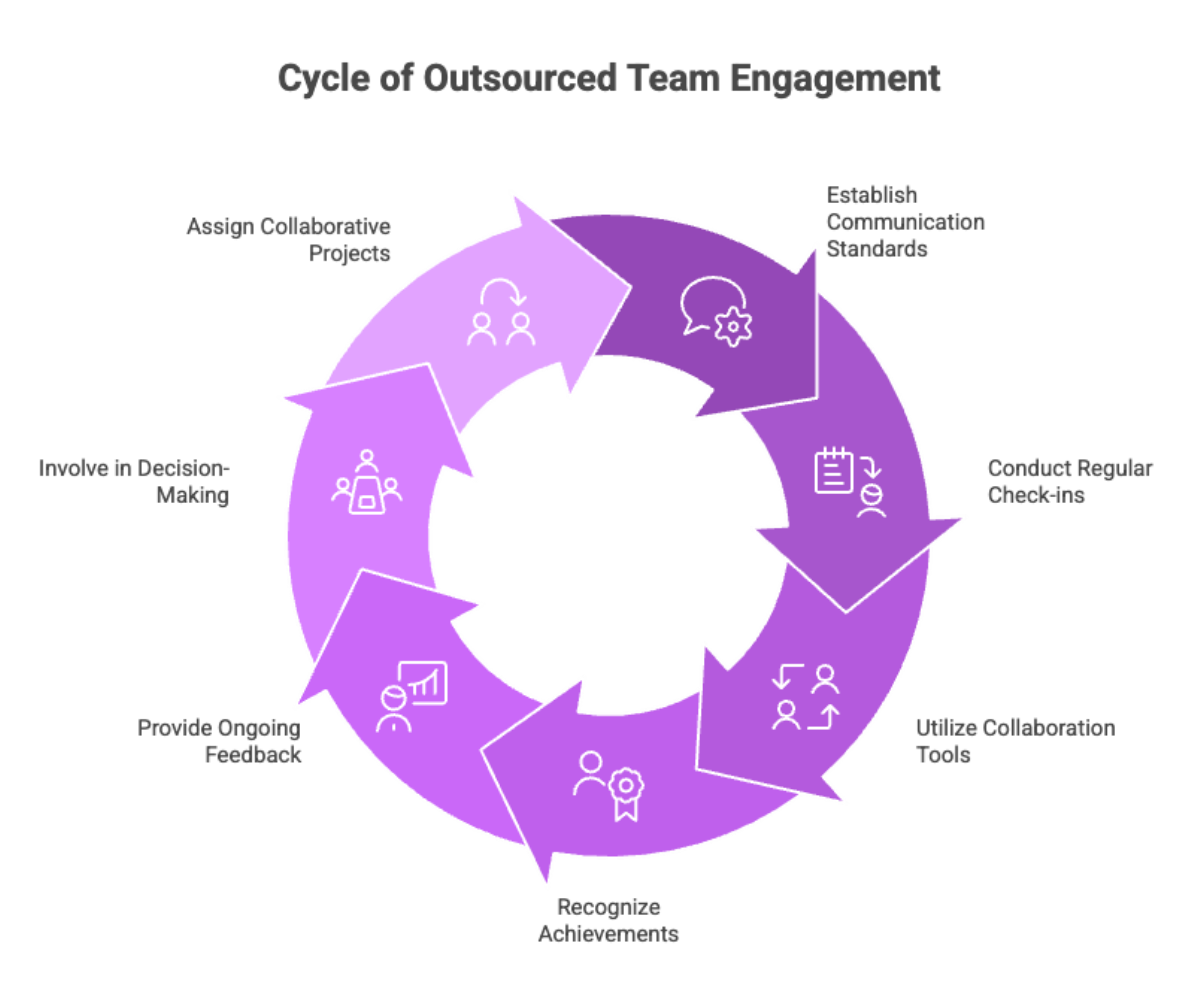

Cost Considerations When Outsourcing Development Teams
Cost considerations are a critical aspect of outsourcing development teams. The cost is influenced by factors such as location, experience, project complexity, hidden costs, and currency fluctuations. Hourly rates for software developers vary significantly by region, with North America ranging from $95 to $170, while Asia typically charges between $25 and $60.
The complexity of a project greatly influences its cost, with simple projects costing between $5,000 to $15,000 and complex ones potentially reaching up to $250,000. Poorly defined project scopes are one of the leading causes of cost overruns, stressing the need for clear project specifications. Implementing clear performance metrics from the start helps manage budgets by ensuring both teams understand the success criteria.
Long-term contracts with outsourcing partners tend to result in lower hourly rates compared to shorter engagements. Outsourcing can lead to cost savings by reducing overhead costs related to hiring, training, and maintaining in-house staff. While hiring a dedicated team may incur higher initial costs, it could prove to be more cost-effective to hire in house in the long run.
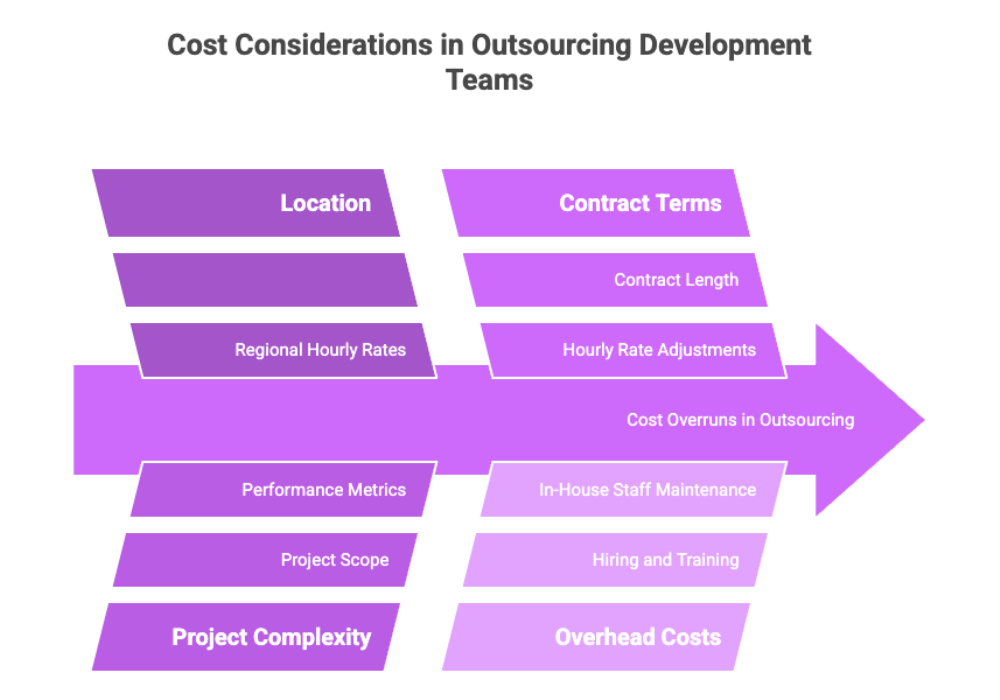

Case Study: Successful Outsourcing Stories
Successful outsourcing stories provide real-world insights into effective strategies and best practices. Slack successfully outsourced its design and application development, gaining 15,000 users within two weeks after launch. This rapid growth showcases the potential of outsourcing to achieve significant milestones quickly.
WhatsApp outsourced its web development to eastern european countries, enabling access to a large pool of tech talent while keeping costs low. This strategic move allowed WhatsApp to focus on its core business functions while leveraging the expertise of external developers.
Alibaba initially faced resource constraints in China and successfully outsourced its web development to specialists in the US, facilitating rapid growth. These examples illustrate how outsourcing can be a powerful tool for overcoming challenges and achieving business goals.
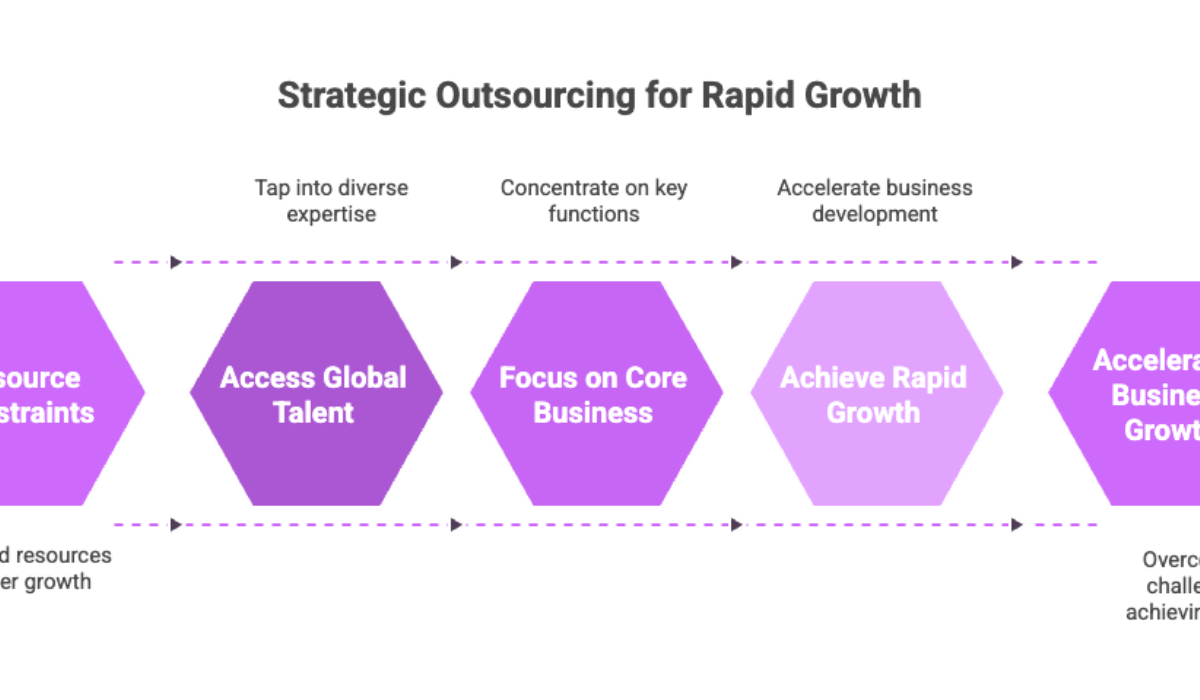

Future Trends in Software Development Outsourcing
The future of software development outsourcing is poised for significant growth and innovation. The global IT industry outsourcing market is projected to reach $1.06 trillion by 2030, driven by advancements in AI technology. Incorporating AI into outsourcing strategies can significantly reduce labor costs and improve project delivery timelines. AI’s ability to efficiently manage large datasets and automate code generation is transforming the software development landscape.
Predictive analytics enabled by AI can help businesses foresee obstacles and optimize decision-making during the software development process. As AI systems continue to evolve, their effectiveness will increasingly depend on the quality of data they utilize, emphasizing the need for careful data management.
These advancements signal a future growth where outsourcing not only remains relevant but becomes even more integral to achieving business success.


Summary
Outsourcing software development teams in 2025 presents a myriad of opportunities for businesses to reduce costs, access specialized skills, and accelerate project timelines. By understanding the benefits, selecting the right team, and leveraging various outsourcing models, companies can navigate the complexities of the global talent pool effectively. Evaluating technical skills, ensuring quality assurance, and protecting intellectual property are crucial steps in this journey.
Effective communication, managing time zone differences, and keeping teams engaged are key to overcoming common challenges in outsourcing. As the industry evolves with advancements in AI and predictive analytics, staying informed about future trends will help businesses harness the full potential of outsourcing. Embrace these strategies to drive innovation, optimize resources, and achieve your business goals with confidence.

Frequently Asked Questions
Outsourcing your development team involves partnering with an external agency to supplement or replace your in house team with skilled outsourced developers. This approach leverages offshore software development and offshore development services to access a diverse talent pool proficient in various programming languages.
By integrating outsourced developers with your existing team or internal team, businesses can fill skill gaps, accelerate project timelines, and optimize resources. Collaborating with a dedicated software development team or an external agency enables companies to focus on core business functions while benefiting from cost savings and specialized expertise.
Why should I consider outsourcing my software development team?
Outsourcing your software development can greatly reduce costs while giving you access to specialized skills and expediting project completion. This approach allows you to concentrate on your core business activities.
What are the key benefits of outsourcing software development teams?
Outsourcing software development teams provides flexibility in scaling projects, optimizes resource management, grants access to a global talent pool, and typically results in faster project completion times. These advantages can significantly enhance a company's operational efficiency and competitiveness.
How can I ensure the quality of outsourced software development?
To ensure the quality of outsourced software development, it's essential to implement rigorous testing processes and use automated testing tools while continuously monitoring performance. This approach will help maintain high standards throughout the development cycle.
What steps should I take to protect my intellectual property when outsourcing?
To protect your intellectual property when outsourcing, ensure that contracts clearly define ownership rights, require non-disclosure agreements (NDAs), and implement security measures like role-based access controls. Additionally, use secure development environments and establish a well-defined exit strategy to safeguard your assets.
How do I keep my outsourced development team engaged and productive?
To keep your outsourced development team engaged and productive, prioritize clear communication, recognize their achievements, and provide ongoing feedback. Involving team members in decision-making and fostering collaboration will also enhance their commitment and performance.


